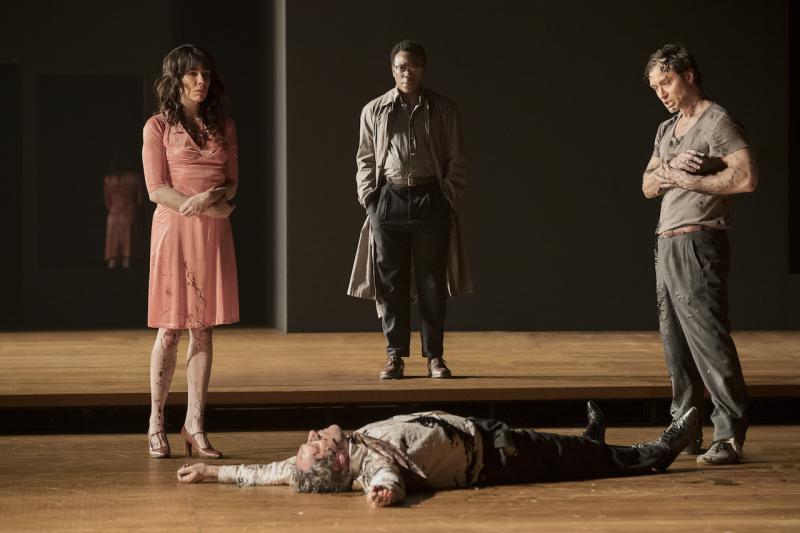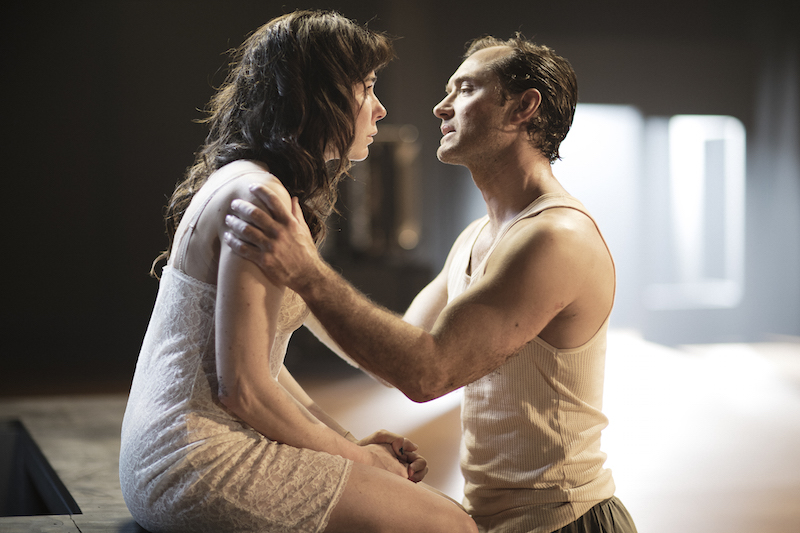Obsession, Barbican review - Jude Law on serious form in Ivo van Hove's latest | reviews, news & interviews
Obsession, Barbican review - Jude Law on serious form in Ivo van Hove's latest
Obsession, Barbican review - Jude Law on serious form in Ivo van Hove's latest
Cultish staging of the Visconti film disappoints

There is a distinctive look, feel, even sound to a stage production directed by Ivo van Hove, which is becoming rather familiar to London theatregoers after two cult hits, A View From the Bridge and Hedda Gabler.
Alas, few of these features earn their keep in the Belgian director's staging at the Barbican of Obsession, the 1942 film by Luchino Visconti, itself a rendering of the James M Cain novel The Postman Always Rings Twice. It’s a curious choice of project given that Visconti’s film is known as the front leader of Italian neo-realism, and van Hove’s style runs counter to realism in every conceivable way.
What clearly attracted him to the story, and to Visconti’s take on it, was the obsession part. A young drifter (Jude Law, showing us what a serious player he is) wanders into an isolated café and starts a coup-de-foudre affair with the proprietor’s young wife (van Hove’s regular muse, Halina Reijn). Since she finds it impossible to leave, the pair conspire to murder her husband. But the combination of guilt and the impossibility of sustaining their obsessive passion undoes them. The twist is that the man, Gino, is ultimately arrested for another death that he didn’t cause. Where the film was at pains to show the shabby, messy reality of the home of the restaurant owner and his wife, the stage set (design: long-term collaborator Jan Versweyveld) is strikingly bare and shiny – a hygiene inspector’s dream. The wife, here renamed Hanna, complains of the humidity and the yowling of neighbourhood cats, just as the film’s characters do. But Van Hove’s busy score only fleetingly brings the sounds of crickets and cats to our attention, as if flagging them in a PowerPoint presentation. He rejects their usefulness in building atmosphere and tension. Cat On a Hot Tin Roof this ain’t.
Where the film was at pains to show the shabby, messy reality of the home of the restaurant owner and his wife, the stage set (design: long-term collaborator Jan Versweyveld) is strikingly bare and shiny – a hygiene inspector’s dream. The wife, here renamed Hanna, complains of the humidity and the yowling of neighbourhood cats, just as the film’s characters do. But Van Hove’s busy score only fleetingly brings the sounds of crickets and cats to our attention, as if flagging them in a PowerPoint presentation. He rejects their usefulness in building atmosphere and tension. Cat On a Hot Tin Roof this ain’t.
Yet the director’s anti-naturalism serves him well in delivering the plot, not only allowing his characters to burst into song, sometimes merging with the café jukebox, but compressing time extremely, if not always with narrative clarity. It’s hardly a spoiler to say that there are two car crashes to be dealt with. On stage, the easy way would be to resort to video, and indeed van Hove does use screens to project close-ups of the lovers’ faces and groping hands. But easy isn’t his way. Instead, he suspends from the ceiling a full-size working combustion engine. It’s the thing that the husband (veteran Dutch star Gijs Scholten van Aschat) is struggling to fix when Gino first appears (symbol alert: his marriage isn't working). Given the precedents for mess and gore in van Hove’s work, it’s not hard to imagine the potential for spewing liquids from a truck engine. And spew they do.
The major problem with this adaptation is the dialogue. We can, I think, cope with the light Dutch accents among the cast, though they give the whole affair a geographically untethered feel (Jude Law’s being a flat, London accent). But the delivery, or at least the spaces between utterances, gives conversations the pace of a snail. And the lines themselves are lumpen, with the result that hard-earned tension leaches away. Simon Stephens is credited with this “English Language Version” which suggests an original in Dutch. But is Jude Law mugging up his Flemish for the coming European tour? It’s a mystery.
Given the combination of Law and a zeitgeisty director, the entire run is already returns-only, and late-comers might save themselves the trouble. Yet while this is a long way off van Hove’s best form, it leaves this reviewer only the more eager to see his return to it.
- Obsession at Barbican Theatre until 20 May
- Read more theatre reviews on theartsdesk
The future of Arts Journalism
You can stop theartsdesk.com closing!
We urgently need financing to survive. Our fundraising drive has thus far raised £49,000 but we need to reach £100,000 or we will be forced to close. Please contribute here: https://gofund.me/c3f6033d
And if you can forward this information to anyone who might assist, we’d be grateful.

Subscribe to theartsdesk.com
Thank you for continuing to read our work on theartsdesk.com. For unlimited access to every article in its entirety, including our archive of more than 15,000 pieces, we're asking for £5 per month or £40 per year. We feel it's a very good deal, and hope you do too.
To take a subscription now simply click here.
And if you're looking for that extra gift for a friend or family member, why not treat them to a theartsdesk.com gift subscription?
more Theatre
 The Weir, Harold Pinter Theatre review - evasive fantasy, bleak truth and possible community
Three outstanding performances in Conor McPherson’s atmospheric five-hander
The Weir, Harold Pinter Theatre review - evasive fantasy, bleak truth and possible community
Three outstanding performances in Conor McPherson’s atmospheric five-hander
 Dracula, Lyric Hammersmith review - hit-and-miss recasting of the familiar story as feminist diatribe
Morgan Lloyd Malcolm's version puts Mina Harkness centre-stage
Dracula, Lyric Hammersmith review - hit-and-miss recasting of the familiar story as feminist diatribe
Morgan Lloyd Malcolm's version puts Mina Harkness centre-stage
 The Code, Southwark Playhouse Elephant review - superbly cast, resonant play about the price of fame in Hollywood
Tracie Bennett is outstanding as a ribald, riotous Tallulah Bankhead
The Code, Southwark Playhouse Elephant review - superbly cast, resonant play about the price of fame in Hollywood
Tracie Bennett is outstanding as a ribald, riotous Tallulah Bankhead
 Reunion, Kiln Theatre review - a stormy night in every sense
Beautifully acted, but desperately grim drama
Reunion, Kiln Theatre review - a stormy night in every sense
Beautifully acted, but desperately grim drama
 The Lady from the Sea, Bridge Theatre review - flashes of brilliance
Simon Stone refashions Ibsen in his own high-octane image
The Lady from the Sea, Bridge Theatre review - flashes of brilliance
Simon Stone refashions Ibsen in his own high-octane image
 Romans: A Novel, Almeida Theatre review - a uniquely extraordinary work
Alice Birch’s wildly epic family drama is both mind-blowing and exasperating
Romans: A Novel, Almeida Theatre review - a uniquely extraordinary work
Alice Birch’s wildly epic family drama is both mind-blowing and exasperating
 The Producers, Garrick Theatre review - Ve haf vays of making you laugh
You probably know what's coming, but it's such great fun!
The Producers, Garrick Theatre review - Ve haf vays of making you laugh
You probably know what's coming, but it's such great fun!
 Not Your Superwoman, Bush Theatre review - powerful tribute to the plight and perseverance of Black women
Golda Rosheuvel and Letitia Wright excel in a super new play
Not Your Superwoman, Bush Theatre review - powerful tribute to the plight and perseverance of Black women
Golda Rosheuvel and Letitia Wright excel in a super new play
 Cow | Deer, Royal Court review - paradox-rich account of non-human life
Experimental work about nature led by Katie Mitchell is both extraordinary and banal
Cow | Deer, Royal Court review - paradox-rich account of non-human life
Experimental work about nature led by Katie Mitchell is both extraordinary and banal
 Deaf Republic, Royal Court review - beautiful images, shame about the words
Staging of Ukrainian-American Ilya Kaminsky’s anti-war poems is too meta-theatrical
Deaf Republic, Royal Court review - beautiful images, shame about the words
Staging of Ukrainian-American Ilya Kaminsky’s anti-war poems is too meta-theatrical
 Laura Benanti: Nobody Cares, Underbelly Boulevard Soho review - Tony winner makes charming, cheeky London debut
Broadway's acclaimed Cinderella, Louise, and Amalia reaches Soho for a welcome one-night stand
Laura Benanti: Nobody Cares, Underbelly Boulevard Soho review - Tony winner makes charming, cheeky London debut
Broadway's acclaimed Cinderella, Louise, and Amalia reaches Soho for a welcome one-night stand
 The Pitchfork Disney, King's Head Theatre review - blazing with dark energy
Thrilling revival of Philip Ridley’s cult classic confirms its legendary status
The Pitchfork Disney, King's Head Theatre review - blazing with dark energy
Thrilling revival of Philip Ridley’s cult classic confirms its legendary status

Add comment